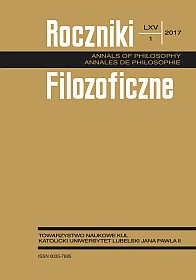O dwóch średniowiecznych koncepcjach celowości natury: Duns Szkot i Chatton
Abstrakt
Artykuł stanowi próbę zarysowania kilku istotnych wątków dwóch istotnych średniowiecznych koncepcji celowości. Twórcami owych koncepcji są Jan Duns Szkot i Walter Chatton. Autor skupia się na trzech zagadnieniach: (1) argumentach na rzecz przyjęcia teleologii naturalnej, (2) statusie ontologicznym celu, (3) statusie Boga jako przyczyny celowej. Dokonywane analizy mają pokazać, iż wiele poglądów wygłaszanych przez Dunsa Szkota i Chattona stanowiło podważenie wcześniejszej scholastycznej wizji całościowej teleologii, która swą najbardziej dojrzała postać otrzymała w myśli Tomasza z Akwinu, przygotowując nadejście nowożytnej krytyki celowości.
Bibliografia
Adams, Marilyn McCord. „Ockham on Final Causality: Muddying the Waters”. Franciscan Studies 56 (1998): 1–46.
Adams, Marilyn McCord. Final causality and explanation of Scotus’s De Primo Principio. W: Nature in Medieval Thought: Some Approaches East and West. Red. Chumaru Koyama, 153–182. Leiden, Boston, Kolonia: Brill, 2000.
Aertsen, Jan. Nature and Creature: Thomas Aquinas’s Way of Thought. Leiden: Brill, 1988.
Barnes, Corey. „Natural Final Causality and Providence in Aquinas.” New Blackfriars 95 (2014): 349-361.
Brown, Stephen. „Ockham and Final Causality”. Studies in Medieval Philosophy 1 (1987.): 249–72.
Frank, William, i Allan Wolter. Duns Scotus, Metaphysician. West Lafayette: Purdue University Press, 1995.
Garret, Don. Teleology in Spinoza and Early Modern Rationalism. W: New Essays on the Rationalists. Red. Rocco J. Gennario i Charles Huenemann, 310–335. Oxford: Oxford University Press, 1999.
Goddu, André. „Ockham’s Philosophy of Nature”. W: The Cambridge Companion to Ockham. Red. Paul V. Spade, 143-167. Cambridge: Cambridge University Press, 1999.
Grant, Edward. Physical Science in the Middle Ages. Cambridge: Cambridge University Press, 1977.
Hamesse, Jacqueline, i Enzo Portalupi. Approche lexicographique de l’intentionnalité et de la finalité dans l’oeuvre de Thomas d’Aquin, w: Finalité et intentionnalité: doctrine thomiste et perspectives modernes: actes du colloque de Louvain-la-Neuve et Louvain, 21-23 mai 1990. Red. Jacques Follon i James McEvoy, 65–92. Leuven: Brill, 1992.
Johnson, Monte Ransome. Aristotle on Teleology. Oxford: Oxford University Press, 2005.
Leibold, Gerhard. „Zum Problem der Finalkausalität bei Wilhelm von Ockham”. Philosophisches Jahrbuch 89 (1982): 247–283.
McDonough, Jeffrey. „The Heyday of Teleology and Early Modern Philosophy”. Midwest Studies in Philosophy 35 (2011): 179–204.
Maier, Anneliese. Das Problem der Finalkausalität um 1320. W: taż. Metaphysische Hintergrunde der Spätscholastischen Naturphilosophie, 273–299. Roma: Edizioni di storia e letteratura, 1955.
Majcherek, Kamil. „Tomasz z Akwinu i William Ockham o celowości świata natury”. Rocznik Tomistyczny 5 (2016): 277–289.
Majcherek, Kamil. „Ockhamowa krytyka teleologii a narodziny nowożytnego rozumienia celowości świata natury” Studia Philosophiae Christianae (przyjęty do druku).
Maurer, Armand. The Philosophy of William of Ockham in Light of Its Principles. Toronto: Pontifical Institute of Medieval Studies, 1999.
Osler, Margaret. „From Immanent Natures to Nature as Artifice: The Reinterpretation of Final Causes in Seventeenth-Century Natural Philosophy.” The Monist 79 (1996), 3: 388–407.
Pasnau, Robert. Intentionality and Final Causes. W: Ancient and Medieval Theories of Intentionality. Red. Dominik Perler, 301–323. Leiden, Boston, Kolonia: Brill, 2001.
Putallaz, François-Xavier. „Efficience et finalité dans le Traité du premier pincipe de Jean Duns Scot”. Revue de théologie et de philosophie Lausanne 116 (1984): 131–146.
Schmaltz, Tad. Descartes on Causation. New York, Oxford: Oxford University Press, 2008.
Watts, Jordan. “Natural Final Causality at the University of Paris from 1250–1360”. Rozprawa doktorska. University of America, 2015.
Weishepl, James. „The Principle Omne quod movetur ab alio movetur in Medieval Physics”. Isis 56 (1965): 26–45.
Wisnowsky, Robert. „Towards a History of Avicenna’s Distinction between Immanent and Transcendent Causes”. W: Before and After Avicenna: Proceedings of the First Conference of the Avicenna Study Group. Red. David C. Reisman, 49–68. Leiden: Brill, 2003.
Copyright (c) 2017 Roczniki Filozoficzne

Utwór dostępny jest na licencji Creative Commons Uznanie autorstwa – Użycie niekomercyjne – Bez utworów zależnych 4.0 Międzynarodowe.





